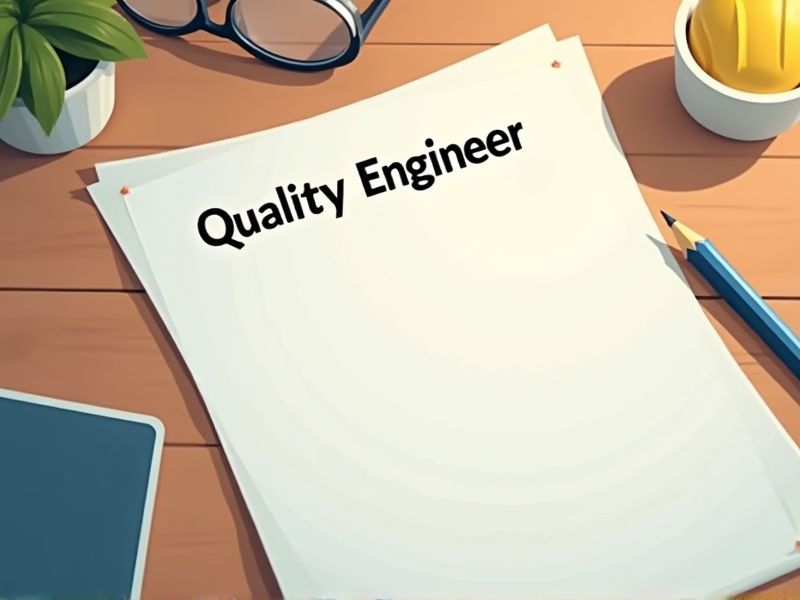
Quality engineers play a crucial role in ensuring that products and processes adhere to specific quality standards and meet regulatory requirements. Obtaining certain certifications validates their expertise and enhances their credibility in the industry. These certifications often provide professionals with updated methodologies and tools essential for effective quality management. Important certifications that may benefit a quality engineer include the Certified Quality Engineer (CQE) and Six Sigma Green Belt.
ASQ Certified Quality Engineer (CQE)
Achieving the ASQ Certified Quality Engineer (CQE) credential enhances a quality engineer's understanding of quality standards and objectives. This certification validates expertise in quality management principles and statistical methods, crucial for maintaining product and process excellence. Employers may prefer hiring certified professionals, as it often correlates with improved performance and reduced errors. Obtaining the CQE can lead to career advancement opportunities due to the recognized commitment to quality and continuous improvement.
ASQ Certified Quality Auditor (CQA)
Possessing an ASQ Certified Quality Auditor (CQA) credential validates a quality engineer's proficiency in auditing principles and practices. This certification often leads to increased career opportunities, as employers recognize the holder's ability to improve processes and compliance. Having a CQA can enhance a company's performance through systematic evaluations and effective corrective actions. The CQA designation often results in higher industry recognition and potential salary increases due to demonstrated expertise.
Certified Manager of Quality/Organizational Excellence (CMQ/OE)
Certified Manager of Quality/Organizational Excellence (CMQ/OE) provides a structured framework for implementing quality management principles, enhancing a quality engineer's effectiveness. Earning a CMQ/OE designation demonstrates a commitment to continuous improvement, which can increase a quality engineer's credibility among peers and within organizations. The certification encompasses a wide array of skills, including leadership and project management, enabling quality engineers to take on more strategic roles in their organizations. Companies often recognize the CMQ/OE as a benchmark for leadership potential, thus expanding career opportunities for certified individuals.
Six Sigma Green Belt Certification
Six Sigma Green Belt Certification equips quality engineers with the skills to identify and eliminate process inefficiencies, enhancing product quality. This certification provides strategic methodologies for data-driven decision-making, critical for maintaining competitive advantages. A quality engineer with Six Sigma expertise often sees improved project outcomes, reducing waste and errors. Many organizations prefer certified professionals, as this indicates a standardized understanding of quality improvement frameworks.
Six Sigma Black Belt Certification
Obtaining a Six Sigma Black Belt Certification empowers quality engineers to identify and eliminate process inefficiencies, directly impacting organizational effectiveness. Mastering Six Sigma methodologies equips them with the tools to drive continuous improvement, resulting in higher quality outputs. The certification also enhances problem-solving skills, enabling engineers to make data-driven decisions that improve product reliability. Employers often seek certified professionals, which can enhance career opportunities and professional credibility within the industry.
Lean Six Sigma Certification
Lean Six Sigma Certification equips quality engineers with tools to identify and eliminate inefficiencies, which enhances organizational performance. The training provided sharpens the ability to use data-driven methodologies to solve complex problems, leading to improved product quality. Certification demonstrates a commitment to continuous improvement, making engineers more valuable in competitive job markets. It fosters a culture of quality and precision, driving projects toward successful outcomes with minimal waste.
ISO 9001:2015 Lead Auditor Certification
The ISO 9001:2015 Lead Auditor Certification equips quality engineers with the skills to assess a company's quality management systems rigorously, leading to improved process efficiency and product quality. Gaining this certification demonstrates a comprehensive understanding of global quality standards, which can enhance a professional's credibility and career prospects. This qualification empowers engineers to identify discrepancies and drive corrective actions, directly contributing to organizational improvement. Companies often seek certified professionals to ensure compliance with international standards, minimizing the risk of quality failures.
Certified Quality Improvement Associate (CQIA)
The Certified Quality Improvement Associate (CQIA) equips quality engineers with foundational knowledge in quality improvement principles, enhancing their professional competency. This certification emphasizes the importance of implementing systematic methods for improving processes, leading to more efficient production and increased customer satisfaction. With a CQIA credential, quality engineers often gain a competitive edge in their field, as employers recognize the certification as a commitment to continuous improvement. The structured framework and recognized standards provided by the CQIA ensure that quality engineers can effectively contribute to their organizations' quality objectives.
Total Quality Management (TQM) Certification
Total Quality Management (TQM) Certification equips quality engineers with a comprehensive framework to systematically improve processes and product quality. Quality engineers with TQM certification often have enhanced credibility, enabling them to effectively drive quality initiatives and foster trust within teams and organizations. The TQM approach encourages a culture of continuous improvement, which can lead to higher customer satisfaction and competitive advantages. Certified engineers can apply standardized practices that reduce waste, improve efficiency, and optimize resource utilization.
Project Management Professional (PMP)
A PMP certification for a quality engineer ensures structured project management approaches, leading to more efficient processes. It enhances risk management skills, reducing potential quality issues in engineering tasks. Certification validates the engineer's commitment to standards, boosting stakeholder confidence. Effective communication and leadership skills acquired through PMP contribute to team cohesion and project success.
Summary
When you obtain certifications as a quality engineer, your credibility in the field significantly increases. This enhanced reputation often results in more career opportunities and potential salary boosts. Companies tend to trust certified professionals, assigning them to critical projects and decision-making roles. Ultimately, your proficiency and industry knowledge are recognized, increasing your value to the organization.
